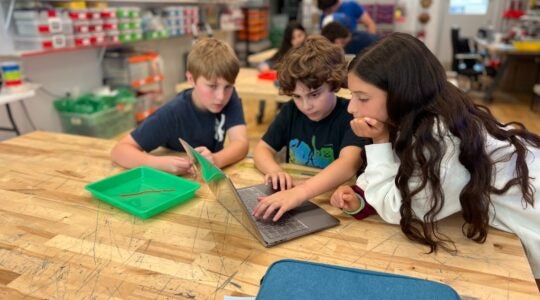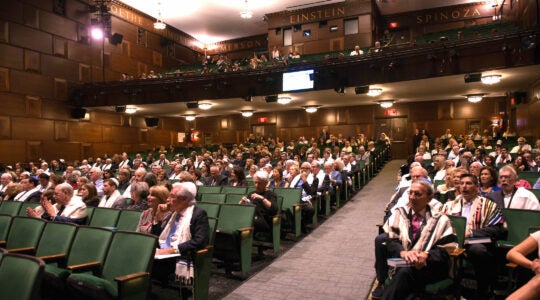For the first time in its 16-year history, LimmudNY hosted its conference on Jewish learning in the middle of New York City.
In previous years, the conference has been held at hotels in New Jersey or upstate New York. Attendees paid a fee covering their hotel stay and food from Thursday night through Monday afternoon. This year, with the intention of making the conference more affordable and accessible, the conference was held at two Upper West Side synagogues, Friday night’s meal at Romemu and the rest of the conference at Rodeph Shalom. It drew about 1,000 people over the three days.
“There is a cost associated with going to a hotel and catering meals at a hotel that gets expensive for people,” said Nahum Twersky, an honorary LimmudNY board member. “I’m happy we can attract a whole new constituency, a whole new demographic, some of whom might not have otherwise attended. That’s very exciting.”
The new setting also allowed for the conference to be offered à la carte: Attendees could pay to go only for the days that worked for their schedule. The greater convenience attracted new participants such as Valerie Gerstein, an Upper West Side mother of a fourth grader and a sixth grader.
“I’ve heard about Limmud over the years, and I used to see Limmud participants of all ages convening in the JCC lobby and going off to some secret place,” she said. “So when I learned that Limmud was going to be on the Upper West Side I felt like I wanted to come and see the people who were a part of something bigger than our individual congregations come together and think.”
Gerstein wanted to bring her kids, but could not since they were sick the weekend of the conference. However, the central location and flexibility the urban conference offered allowed her to come just for Monday’s sessions. She attended a talk from Moving Traditions on talking to adolescents about sexuality, which she felt was relevant because her kids are nearing their teenage years.
There were more than 50 walk-ins for Saturday night’s Havdalah, talks and jam session, and more than 30 for Sunday’s sessions.
While the urban setting had its benefits, some organizers and participants voiced concern that a certain sense of community would be lost.
“When you’re in residency at a place there’s some folksiness to it,” Twersky said. “People hang out on a Shabbat afternoon in the lobby and talk and schmooze and chat with each other and I think some people think that’s going to be missing, and no doubt it will be, because we’re not there. But notwithstanding, what we tried to do is simulate as much as we could in this urban setting.”
In addition to the Friday night dinner at Romemu, the conference offered a Havdalah event on Saturday night with a concert, speakers, and a late-night jam session. Twersky also sponsored a Shabbat kiddush at Darkhei Noam on the Upper West Side to make sure out-of-towners had somewhere to go.
While smaller than in previous years, the Shabbat dinner was still a place where attendees could meet new people. At the table I sat at, most people didn’t know each other. There was a Modern Orthodox rabbi from St. Louis, a corporate lawyer from Queens, a chemist who had recently moved to Teaneck, a couple from Poughkeepsie, and a retired case manager from Baltimore. By the end of the night, the rabbi was deep in a discussion about Bereishit with the man from New Jersey, who spoke to the table about moving to Teaneck because his community in Connecticut had dwindled.
The enthusiastic chatter only stopped for dvar Torahs given by Romemu clergy, Pardes President Leon Morris and Twersky.
And people who had come in previous years had an appreciation for this year’s conference and its unique advantages.
“The pro of the hotel is you stay in the headspace the whole time and you run into conference people, it’s a very insular experience,” said Wendy Gross Alexander, a theater teacher. “The pro of this is it’s cheaper and there’s more control over your meals. You can also do double duty with other New York City tourist things.”
Elisheva Malomet, a high school senior from Pennsylvania, was at Limmud for the third time.
“It’s definitely different,” she said. “I’ve never been in Rodeph Shalom before, but I still felt the same warmth I would feel at the residential hotel environment. I know a lot of people felt it was a really big change, but at the end of the day I saw more students here, which is really great for me because I’m a younger attendee.”
The sense of community comes to life in sessions too, not just dinners. A talk entitled, “Helping Teens Navigate a #MeToo World with Jewish Wisdom and Values,” included such topics as how to talk to teens about their outfits if parents feel they are inappropriate for bar and bat mitzvahs.
The urban setting was not this year’s only first. On Monday, the sessions had a common theme: “Happiness and Healing Resources in Jewish Life.”
Sessions included such topics as “What did Hamilton Drink? Jews and Chocolate in Colonial North America,” “Sexual Consent in the Talmud?”, “Create Your Calm Through Organizing,” “The Criminalization of Walking” (how local laws are hampering Judaism’s pedestrian-oriented Shabbat culture), “Sauerkraut Soiree” (where participants make pickles and discuss the benefits of pickling and fermentation) and even the emotional and developmental benefits of baking with your children, a session led by Silver Moon Bakery owner Judith Norrell and her daughter, Gabrielle Stasfogel-Ryklin. Attendees were sent home with fresh sourdough which they were taught to braid or twist as Stasfogel-Ryklin, a special education teacher, spoke about the lessons in math and delayed gratification children can learn from the culinary discipline.
Dr. Julie Hirschfeld, a psychotherapist on the Upper West Side who came up with the theme, said she noticed a trend of rabbis incorporating secular psychological perspectives on happiness and mental health. In her introduction to the day’s sessions, she told the audience that, “Our Jewish practices, texts, and traditions offer beautiful ways to care for our bodies, our minds, our souls and each other.”
“When we see today’s research in disease prevention and recovery, on the literally fatal effects of loneliness,” she continued, “we appreciate the wisdom of mitzvot that bring us close for the sake of ritual and offer guidelines for living with others.”
The New York Jewish Week brings you the stories behind the headlines, keeping you connected to Jewish life in New York. Help sustain the reporting you trust by donating today.




